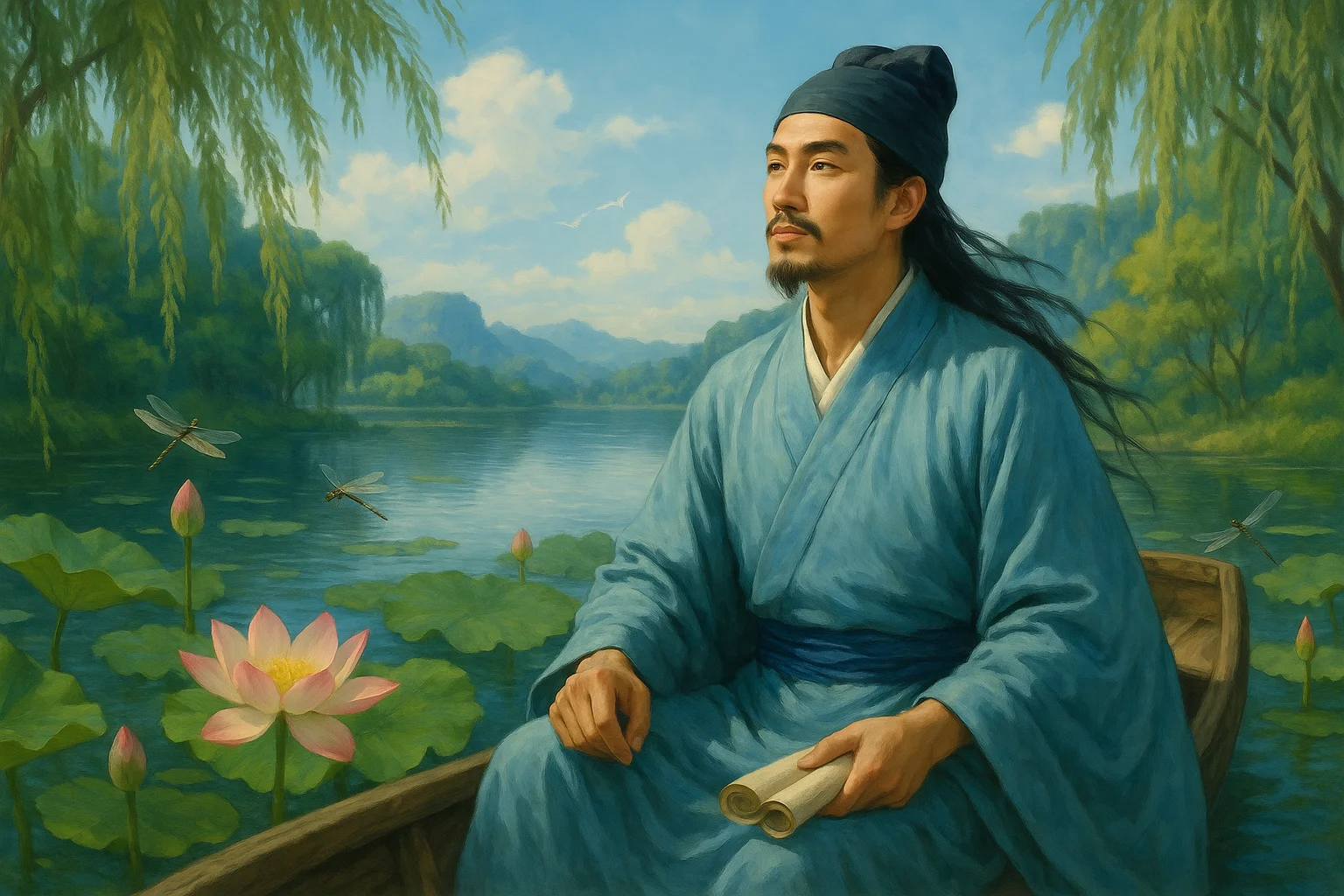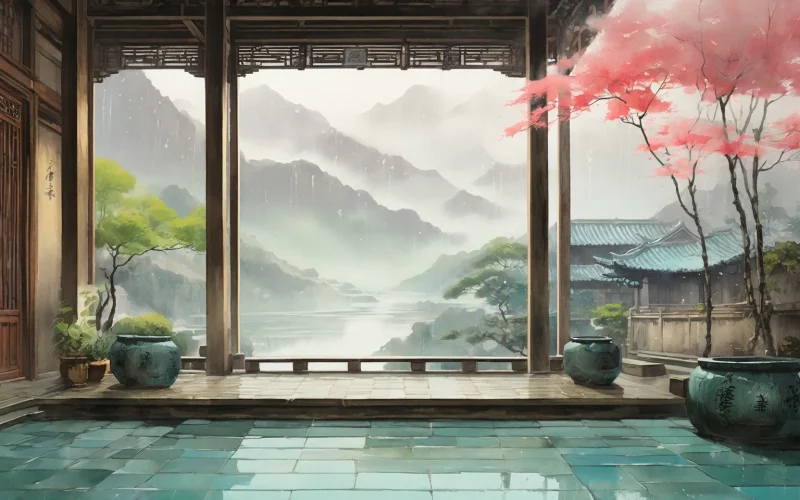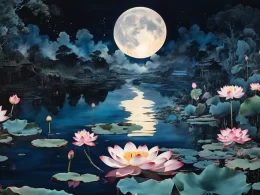The rain falls sparse and fine—neither much nor gone,
Refusing to cease though its force is withdrawn.
As if begrudging poets the mountain view,
It hangs a bead-curtain to hide peaks from you.
Original Poem
「小雨」
杨万里
雨来细细复疏疏,纵不能多不肯无。
似妒诗人山入眼,千峰故隔一帘珠。
Interpretation
Composed during the Qiandao era of Emperor Xiaozong of Southern Song. Yang Wanli encountered light rain during a journey and composed this piece. It was early summer, and as he traveled through the mountains, fine drizzle fell continuously, inspiring the poet. Throughout his life, Yang traveled extensively and particularly loved depicting rain scenes, often transforming ordinary sights into vivid and delightful imagery. Though brief, this poem "Light Rain" embodies the essence of his Chengzhai style: natural simplicity infused with wit and charm.
First Couplet: "雨来细细复疏疏,纵不能多不肯无。"
Yǔ lái xìxì fù shūshū, zòng bùnéng duō bù kěn wú.
The rain arrives fine and sparse,
Though never abundant, it refuses to cease.
These lines convey not only the state of the light rain but also the poet’s inner mood. Though delicate, this drizzle surpasses parched drought—a blessing for farmers and a delight for travelers. The reduplicated characters "fine" (细细 xìxì) and "sparse" (疏疏 shūshū) depict the rain’s ethereal dance, like musical notes suspended in air. Beyond objective description, this reflects psychological projection: the poet welcomes the rain, however slight, for it breathes vitality into the world.
Second Couplet: "似妒诗人山入眼,千峰故隔一帘珠。"
Sì dù shīrén shān rù yǎn, qiān fēng gù gé yī lián zhū.
As if envying the poet’s mountain view,
A beaded curtain veils a thousand peaks.
The brilliance lies in "envy" (妒 dù). Rain, inherently emotionless, is personified—seemingly competing with the poet for nature’s beauty. This playful "envy" animates the scene. Simultaneously, "a beaded curtain" (一帘珠 yī lián zhū) vividly materializes: raindrops form a curtain of pearls, rendering distant peaks hazy and elusive. This shift from clarity to obscurity transcends visual change, elevating the意境 (yìjìng, artistic conception) into a realm of ethereal elegance.
Holistic Appreciation
Centered on light rain, the poem radiates the poet’s childlike wonder. The opening couplet employs reduplication to capture the rain’s form with precision; the latter lines personify the rain, endowing nature with spirit. Though obscuring the mountains, the "beaded curtain" adds mystique. Rather than resenting the obstruction, the poet discovers new aesthetic pleasure.
This approach epitomizes Yang Wanli—he uncovers whimsy in mundane moments, elevating the ordinary to poetry. Unlike Du Fu’s solemnity or Su Shi’s expansiveness, Yang’s tone is light, fresh, and tinged with innocence. Through this poem, readers glimpse not only the rain’s liveliness but also the poet’s serene, humorous spirit.
Artistic Merits
- Reduplicated characters craft atmosphere and rhythm: "Fine" (细细) and "sparse" (疏疏) capture both visual texture and auditory cadence, evoking raindrops’ gentle percussion.
- Personification sparks playful charm: "As if envying" (似妒 sì dù) transforms rain into a sentient rival, framing it as a mischievous child "veiling" the mountains—a dynamic that infuses the verse with wit.
- Innovative metaphor creates unique imagery: "A beaded curtain" (一帘珠) reimagines ordinary raindrops as pearls, conjuring朦胧美 (ménglóng měi, misty beauty).
- Seamless shift from reality to mood: The first couplet observes; the second contemplates. Rain becomes both external phenomenon and internal reflection. The poet embraces its poetic gift rather than lamenting obscured views, revealing his signature optimism: finding profundity in simplicity.
- Deceptively simple language: Unadorned diction conveys complex imagery and nuanced emotion—hallmark of the Chengzhai style, where apparent simplicity masks exquisite craft.
Insights
This small poem teaches that poetry dwells not in grandeur but in life’s subtle moments. Yang Wanli spun inspiration from ordinary drizzle, alchemizing the mundane into magic. It reminds us to nurture childlike curiosity and keen observation, discovering beauty in life’s minutiae—even a wisp of rain may transform into poetic pearls.
About the Poet

Yang Wanli (杨万里 1127 - 1206), a native of Jishui in Jiangxi, was a renowned poet of the Southern Song Dynasty, celebrated as one of the "Four Great Masters of the Restoration" alongside Lu You, Fan Chengda, and You Mao. He attained the jinshi degree in 1154 and rose to the position of Academician of the Baomo Pavilion. Breaking free from the constraints of the Jiangxi School of Poetry, he pioneered the lively and natural "Chengzhai Style," advocating for learning from nature and employing plain yet profound language. His poetry, often drawing inspiration from everyday life, profoundly influenced later schools of lyrical expression, particularly the Xingling (Spirit and Sensibility) School.












